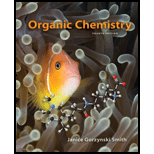
What
results.
a.  b.
b.  c.
c.  d.
d.

(a)
Interpretation: The alkenes formed by the treatment of given alcohol with
Concept introduction: Alcohols undergo dehydration reaction in the presence of strong acids like
Answer to Problem 9.48P
The alkenes formed by the treatment of given alcohol with

Explanation of Solution
The given alcohol contains two
Alcohols undergo dehydration reaction in the presence of strong acids like
Thus, the alkenes formed by the treatment of given alcohol with

Figure 1
The alkenes formed by the treatment of given alcohol with
(b)
Interpretation: The alkenes formed by the treatment of given alcohol with
Concept introduction: Alcohols undergo dehydration reaction in the presence of strong acids like
Answer to Problem 9.48P
The alkenes formed by the treatment of given alcohol with

Explanation of Solution
The given alcohol contains two
Alcohols undergo dehydration reaction in the presence of strong acids like
Thus, the alkenes formed by the treatment of given alcohol with

Figure 2
The alkenes formed by the treatment of given alcohol with
(c)
Interpretation: The alkenes formed by the treatment of given alcohol with
Concept introduction: Alcohols undergo dehydration reaction in the presence of strong acids like
Answer to Problem 9.48P
The alkenes formed by the treatment of given alcohol with

Explanation of Solution
The given alcohol contains three
Alcohols undergo dehydration reaction in the presence of strong acids like
Thus, the alkenes formed by the treatment of given alcohol with

Figure 3
The alkenes formed by the treatment of given alcohol with
(d)
Interpretation: The alkenes formed by the treatment of given alcohol with
Concept introduction: Alcohols undergo dehydration reaction in the presence of strong acids like
Answer to Problem 9.48P
The alkene formed by the treatment of given alcohol with
Explanation of Solution
The given alcohol contains two
Alcohols undergo dehydration reaction in the presence of strong acids like
The alkenes formed by the treatment of given alcohol with
(e)
Interpretation: The alkenes formed by the treatment of given alcohol with
Concept introduction: Alcohols undergo dehydration reaction in the presence of strong acids like
Answer to Problem 9.48P
The alkenes formed by the treatment of given alcohol with

Explanation of Solution
The given alcohol contains two
Alcohols undergo dehydration reaction in the presence of strong acids like
Thus, the alkenes formed by the treatment of given alcohol with

Figure 4
The alkenes formed by the treatment of given alcohol with
Want to see more full solutions like this?
Chapter 9 Solutions
Organic Chemistry-Package(Custom)
- What is the final product when D-galactose reacts with hydroxylamine?arrow_forwardIndicate the formula of the product obtained by reacting methyl 5-chloro-5-oxopentanoate with 1 mole of 4-penten-1-ylmagnesium bromide.arrow_forwardIn the two chair conformations of glucose, the most stable is the one with all the OH groups in the equatorial position. Is this correct?arrow_forward
- please help me with my homeworkarrow_forwardhelparrow_forwardThe temperature on a sample of pure X held at 1.25 atm and -54. °C is increased until the sample boils. The temperature is then held constant and the pressure is decreased by 0.42 atm. On the phase diagram below draw a path that shows this set of changes. pressure (atm) 2 0 0 200 400 temperature (K) Xarrow_forward
- QUESTION: Answer Question 5: 'Calculating standard error of regression' STEP 1 by filling in all the empty green boxes *The values are all provided in the photo attached*arrow_forwardpressure (atm) 3 The pressure on a sample of pure X held at 47. °C and 0.88 atm is increased until the sample condenses. The pressure is then held constant and the temperature is decreased by 82. °C. On the phase diagram below draw a path that shows this set of changes. 0 0 200 temperature (K) 400 аarrow_forwarder your payment details | bar xb Home | bartleby x + aleksogi/x/isl.exe/1o u-lgNskr7j8P3jH-1Qs_pBanHhviTCeeBZbufuBYT0Hz7m7D3ZcW81NC1d8Kzb4srFik1OUFhKMUXzhGpw7k1 O States of Matter Sketching a described thermodynamic change on a phase diagram 0/5 The pressure on a sample of pure X held at 47. °C and 0.88 atm is increased until the sample condenses. The pressure is then held constant and the temperature is decreased by 82. °C. On the phase diagram below draw a path that shows this set of changes. pressure (atm) 1 3- 0- 0 200 Explanation Check temperature (K) 400 X Q Search L G 2025 McGraw Hill LLC. All Rights Reserved Terms of Use Privacy Cearrow_forward
 ChemistryChemistryISBN:9781305957404Author:Steven S. Zumdahl, Susan A. Zumdahl, Donald J. DeCostePublisher:Cengage Learning
ChemistryChemistryISBN:9781305957404Author:Steven S. Zumdahl, Susan A. Zumdahl, Donald J. DeCostePublisher:Cengage Learning ChemistryChemistryISBN:9781259911156Author:Raymond Chang Dr., Jason Overby ProfessorPublisher:McGraw-Hill Education
ChemistryChemistryISBN:9781259911156Author:Raymond Chang Dr., Jason Overby ProfessorPublisher:McGraw-Hill Education Principles of Instrumental AnalysisChemistryISBN:9781305577213Author:Douglas A. Skoog, F. James Holler, Stanley R. CrouchPublisher:Cengage Learning
Principles of Instrumental AnalysisChemistryISBN:9781305577213Author:Douglas A. Skoog, F. James Holler, Stanley R. CrouchPublisher:Cengage Learning Organic ChemistryChemistryISBN:9780078021558Author:Janice Gorzynski Smith Dr.Publisher:McGraw-Hill Education
Organic ChemistryChemistryISBN:9780078021558Author:Janice Gorzynski Smith Dr.Publisher:McGraw-Hill Education Chemistry: Principles and ReactionsChemistryISBN:9781305079373Author:William L. Masterton, Cecile N. HurleyPublisher:Cengage Learning
Chemistry: Principles and ReactionsChemistryISBN:9781305079373Author:William L. Masterton, Cecile N. HurleyPublisher:Cengage Learning Elementary Principles of Chemical Processes, Bind...ChemistryISBN:9781118431221Author:Richard M. Felder, Ronald W. Rousseau, Lisa G. BullardPublisher:WILEY
Elementary Principles of Chemical Processes, Bind...ChemistryISBN:9781118431221Author:Richard M. Felder, Ronald W. Rousseau, Lisa G. BullardPublisher:WILEY





